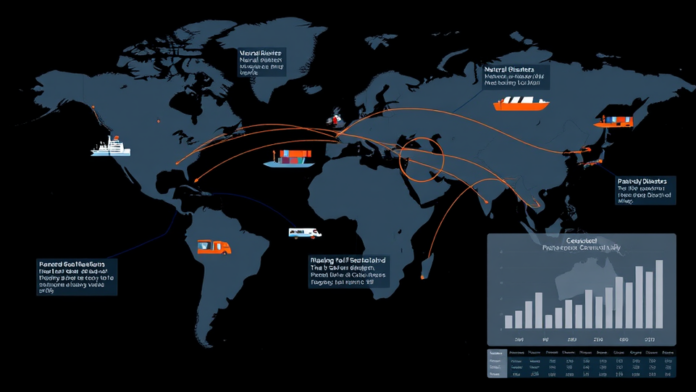Introduction to Global Supply Chain Disruptions
Definition and Overview
Global supply chain disruptions refer to significant interruptions in the flow of goods and services. These disruptions can arise from various factors, including natural disasters, geopolitical tensions, and pandemics. Such events can severely impact businesses, leadjng to delays and increased costs. Understanding these disruptions is crucial for effective risk management. Awareness is key in navigating these challenges. Businesses must adapt to maintain their competitive edge.
Historical Context and Recent Trends
Historically, supply chain disruptions have occurred due to wars, economic crises, and natural disasters. Recent trends show an increase in frequency and severity. Factors include globalization and reliance on just-in-time inventory systems. This reliance can lead to vulnerabilities. Businesses must recognize these patterns. Awareness can drive better preparedness.
Causes of Supply Chain Disruptions
Natural Disasters and Climate Change
Natural disasters and climate change significantly disrupt supply chains. For instance, hurricanes canful damage infrastructure and halt production. This leads to delays in delivery. Additionally, rising sea levels threaten coastal facilities. Companies must assess their vulnerabilities. Preparedness is essential for resilience. Understanding these risks is crucial for strategic planning.
Geopolitical Tensions and Trade Policies
Geopolitical tensions and trade policies can severely impact supply chains. Tariffs and sanctions disrupt established trade routes. This results in increased costs and delays. Furthermore, political instability can lead to uncertainty in markets. Companies must navigate these complexities cqrefully. Strategic planning is vital for mitigating risks. Understanding the landscape is essential for success.
Impact on Global Trade
Effects on Import and Export Dynamics
Supply chain disruptions significantly alter import and export dynamics. For instance, delays in shipping can lead to inventory shortages. This creates pressure on pricing strategies. Additionally, fluctuating tariffs can affect competitiveness in global markets. Companies must adapt their logistics accordingly. Strategic adjustments are essential for maintaining market position. Awareness of these changes is crucial for success.
Shifts in Trade Routes and Logistics
Shifts in trade routes and logistics can significantly impact global trade. Changes in shipping lanes often result from geopolitical tensions. This can lead to increased transit times. Additionally, companies may need to find alternative suppliers. Flexibility in logistics is essential for resilience. Adapting quickly is crucial for success. Awareness of these shifts is vital.
Financial Implications for Businesses
Cost Increases and Profit Margins
Cost increases directly affect profit margins for businesses. Rising transportation and raw material costs can erode profitability. This necessitates careful financial planning. Additionally, companies may need to adjust pricing strategies. Maintaining competitive pricing is essential. Strategic cost management is crucial for sustainability. Awareness of financial dynamics is life-sustaining for success.
Cash Flow Management Challenges
Cash flow management presents significant challenges for businesses. Disruptions can lead to delayed payments from clients. This creates liquidity issues that hinder operations. Additionally, unexpected expenses can strain financial resources. Companies must prioritize effective cash flow strategies. Monitoring cash flow is essential for stability. Awareness of these challenges is crucial for success.
Technological Solutions to Mitigate Disruptions
Role of Financial Technology in Supply Chain Management
Financial technology plays a crucial role in supply chain management. Advanced analytics can predict disruptions before they occur. This allows companies to implement proactive measures. Additionally, blockchain technology enhances transparency and traceability. Improved visibility can reduce fraud and errors. Companies can make informed decisions quickly. Embracing technology is essential for resilience.
Innovations in Data Analytics and AI
Innovations in data analytics and AI significantly enhance supply chain resilience. Predictive analytics can identify potential disruptions early. This enables timely interventions to mitigate risks. Machine learning algorithms optimize inventory management and demand forecasting. Improved accuracy leads to better resource allocation. Companies can respond swiftly to market changes. Adopting these technologies is essential for competitiveness.
Case Studies of Businesses Adapting to Disruptions
Successful Strategies from Leading Companies
Leading companies have implemented successful strategies to adapt to disruptions. For example, one firm diversified its supplier base to reduce risk. This approach enhances flexibility and resilience. Another company invested in advanced analytics for better decision-making. Improved insights lead to more effective responses. These strategies demonstrate the importance of adaptability. Companies must continuously evolve to thrive.
Lessons Learned and Best Practices
Businesses have learned valuable lessons from recent disruptions. For instance, maintaining a flexible supply chain is crucial. This adaptability allows for quick responses to changes. Additionally, investing in technology enhances operational efficiency. Companies that prioritize data-driven decision-making perform better. These best practices foster resilience in uncertain environments. Awareness of potential risks is essential for success.
Future Outlook and Recommendations
Predicted Trends in Supply Chain Management
Future trends in supply chain management indicate increased automation. Companies are likely to adopt advanced robotics for efficiency. This shift can reduce labor costs significantly. Additionally, sustainability will become a key focus area. Businesses must integrate eco-friendly practices into operations. Enhanced data analytics will drive better decision-making. Awareness of these trends is essential for competitiveness.
Strategic Recommendations for Businesses
Businesses should prioritize the following strategic recommendations:
These actions can improve resilience against disruptions. Companies must adapt to changing market conditions. Awareness of these strategies is crucial for success.

